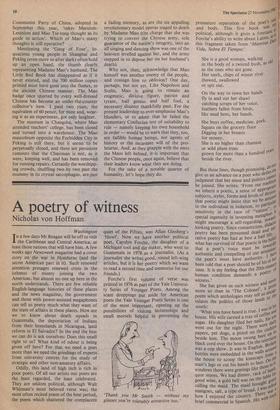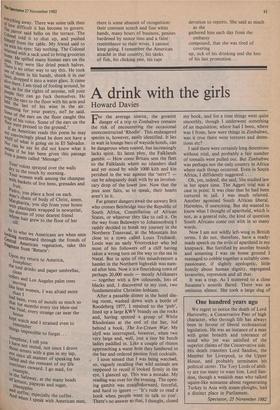A poetry of witness
Nicholas von Hoffman
Washington In a few days Mr Reagan will be off to visit the Caribbean and Central America, at least those nations that will have him. A few weeks ago Newsweek magazine had a cover story on the war in Honduras (and the secret American part in it). Such renewed attention presages renewed crisis in the isthmus of misery joining the two Americas, but almost no one up here in the north understands. There are few reliable English-language histories of these places and the news magazine, the government and those with 'power-assisted megaphones can tell us pretty much what they want of the state of affairs in these places. How are we to know about death squads in Guatemala, the deportation of Indians from their homelands in Nicaragua, land reform in El Salvador? In the end the best we can do is ask ourselves: Does this smell right to us? What kind of odour is being given off here? For that we need a poet more than we need the grindings of experts from university centres for the study of strategic and other non-amatory affairs.
Oddly, this land of high tech is rich in poor poets. Of all our artists our poets are the least regarded, the least celebrated. They are seldom political, although Walt Whitman's most beloved verse was; the most often recited poem of the beat period, the poem which shattered the complacent quiet of the Fifties, was Allan Ginsberg's `Howl'. Now we have another political poet, Carolyn Forche, the daughter of a Michigan tool and die maker, who went to Guatemala in 1978 as a journalist. (As a journalist she writes good, sound left-wing articles, but it is her poetry which we want to read a second time and memorise for our friends.) Forche's first volume of verse was printed in 1976 as part of the Yale Universi- ty Series of Younger Poets. Among the scant droppings put aside for American poets the Yale Younger Poets Series is one of the most important, opening up the possibilities of visiting lectureships and small morsels helpful in preventing the `Thank you Mr Smith — without my glasses you're tolerably attractive too.' premature separation of the poet's soot and body. This first book was O political, although it gives a foretaste °,f Forche's ability to write about Latins, as is
,,
this fragment taken from `Mientras Dar` Vida, Sobra El Tiempo:'
She is a good woman, walking ,, in the body of a twisted bush, as ow as the ones who are gone.
Her teeth, chips of winter river thawed, swallowed or spit out.
On the way to town her hands fly in and out her shawl catching scraps of her voice, feathers fallen from birds, like mud hens, her hands.
She buys coffee, medicine, pork.
Squats on the grocery floor Digging in her breasts for money.
She is no higher than chamisa or wild plum trees
grown for more than a hundred Years
beside the river.
But those lines, though promising, do be give us an advance on a poet who defies judgment that her muse and politics i;0to wbe e joined. aS hpeo ewt ei e as : s'eFnrsoemo fo ua pr pt rr oala subjects, styles, forms and levels of clicr'lci tt oh atthpoeticvmi diugahlt in insist n si si sot l at thiaotn vv, teobpe aarttti cutjai sensitivity in the race of "natureli special ingenuity in inventing metaph°r'd, might encourage a self-regarding, inwarc looking poetry. Since romanticism, didaeti poetry has been presumed dead and nar' rative poetry has had at best a half lifeii.ef what has survived of that poetic is the be'civ that apoet's voice must be inwar n. authentic and compelling of our attenti°,4. the poet's must have authority. I li!et been told that a poet should be of his or het time. It is my feeling that the 20th-eentaof whuhnineasns.,condition demands a Peril' She has given us such witness and never more so than in `The Colonel', a Pr,°,0 poem which anthologies may tell us prop ssuoluatthes: the politics of those lands t° the so` his `What you have heard is true. I was —„rgl house. His wife carried a tray of coffee ',1 sugar. His daughter filed her nails, his went out for the night. There were da.on papers, pet dogs, a pistol on the cosillio beside him. The moon swung bare °r1.00 black cord over the house. On the televisicten was a cop show. It was in English. Or°,,iid bottles were embedded in the walls or°' 0 the house to scoop the kneecaps fr°11/11,e man's legs or cut his hands to lace. 01!li windows there were gratings like those quor stores. We had dinner, rack of , for good wine, a gold bell was on the table co calling the maid. The maid brought gri,ed mangoes, salt, a type of bread. I was as..5 a how I enjoyed the country. There waoc,i; brief commercial in Spanish. His wife t everything away. There was some talk then .r.,°f how difficult it has become to govern. r,'" Parrot said hello on the terrace. The meh'nicnel told it to shut up, and pushed „Iniself from the table. My friend said to with his eyes: Say nothing. The Colonel hreturned with a sack used to bring groceries tTne. He spilled many human ears on the They were like dried peach halves. "ere is no other way to say this. He took face of them in his hands, shook it in our droPped it into a water glass. It cameve there. I am tired of fooling around, he said as for the rights of anyone, tell your sMelle they can go fuck themselves. He hwelePt the ears to the floor with his arm and S rnething so held the last of his wine in the air. for your poetry, no? he said. scrap ofof the ears on the floor caught this flr, of his voice. Some of the ears on the If t' were pressed to the ground.' 00, an American reads this poem he may Wh'.,corivincingly plead he does not have a of what is going on in El Salvador. 0: can he say he did not know what it fro-ans if he has been given this passage In a poem called 'Message':
Yo , ur voices sprayed over the walls to the touch by morning. Your women walk among the champas With baskets of live hens, grenades and fruit.
Pedro, you place a host on each man's chant of body of Christ, amen. Ivi.argharita, you slip from your house teeth Plastiques wrapped in newsprint, dossier of your dearest friend nose hair grew to the floor of her cill.
As
inr,t, to who we Americans are when seen f 6'418 northward through the fronds o. fpitral Atnerican vegetation, take this fragment from 'Return':
Upon my return to America, k Josephine:
the iced drinks and paper umbrellas, clean
toilets and Los Angeles palm trees Moving like lean women, I was afraid more than I
had been, even of motels so much so that for months every tire blow-out Was final, every strange car near the , house
Kept watch and I strained even to
k remember things impossible to forget.. jtoksepnine, I tell you have not rested, not since I drove those streets with a gun in my lap, not since all manner of speaking has failed and the remnant of my life Continues onward. I go mad, for example, in the Safeway, at the man heads
of lettuce y , papayas and sugar, Pineapp
and coffee, papayas
especially the coffee.
And when I speak with American men,
there is some absence of recognition: their constant scotch and fine white hands, many hours of business, penises hardened by motor inns and a faint resemblance to their wives. I cannot keep going. I remember the American attaché in that country, his tanks of fish, his clicking pen, his rapt devotion to reports. She said as much as she gathered him each day from the embassy compound, that she was tired of covering up, sick of his drinking and the loss of his last promotion ...











































 Previous page
Previous page